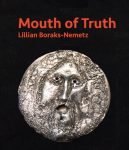Lillian Boraks-Nemetz’s newest book, Mouth of Truth (Ekstasis Editions, 2017) is not an easy, escape-from-reality read, but it’s an interesting and important read. What does it mean to be a survivor? How does one person’s trauma affect those around them? Is healing possible? These are but a few of the many questions that Mouth of Truth elicits.
The novel is based on the experiences of Boraks-Nemetz, who is a Holocaust survivor. Born in Warsaw, Poland, she escaped the Warsaw Ghetto, and survived the war by hiding under a false identity.
“My life’s story is, of course, similar to the book’s,” Boraks-Nemetz told the Independent. “I suffered in childhood, in adolescence, girlhood and womanhood. It is only now, in my senior years, that I have found some degree of peace.”
The protagonist of Mouth of Truth is Batya, who still struggles with Beata (Bea), her wartime identity, even though she has been in Canada for decades. Her Canadian-born husband, Joseph, and their children, Sam and Miriam, have no idea of the trauma with which she is attempting to deal. She drinks to suppress her more feisty Bea personality and their memories – not only of the ghetto, but of abuse by the man entrusted with her care, and others. Though this method of coping isn’t working, Batya manages to keep her nose above water until she accompanies her friend Antonia on a visit to see Antonia’s brother in prison. The visit unleashes recollections of her tragic childhood and Batya can no longer hide from herself or her past. She must confront her dueling identities – and rumours about her father.
Batya finds out that her father might have been one of the Jewish police in the ghetto; not only that, but one who did some awful things, including helping the Nazis round up Jews for deportation. On his deathbed, her father apologizes. But for what? Batya’s mother will not talk about what happened in the ghetto and Batya must find out for herself of what her father was guilty, if anything.
The investigation, as well as Batya’s healing, requires that she leave her family and home in Vancouver. She travels first to Toronto, then to Italy and Poland. In Italy, she meets Grisha, with whom she has an affair, and experiences passion and desire. She initially confuses her feelings with love, but comes to realize the difference as she and Grisha travel together in Poland.
Between her research in Toronto and in Europe, Batya learns much about her father. She is also helped by her mother. When Batya first arrives in Toronto, her mother – who has never wanted to talk about the war – sends Batya a package of her father’s writings. Batya receives a second package when she returns from Europe.
With the first package, her mother writes, “I had always thought that because you were a mere child when all that happened to us, it would not touch you. Could I have been wrong?” Her mother also clearly states, “I have chosen to forget the past and start a new life. I don’t want to go back there either.”
In the note accompanying the second package, her mother concedes, “By shielding you, I may have done more harm than good. No matter what you might think of your father, he was a good man.” She also writes, “It never occurred to me before that I owe you the truth. Maybe I have kept secrets from you for too long.”
Batya, too, has secrets. Though she tried several times, she was not able to tell her children what happened to her during the war. As for her father’s actions, she had no idea herself, until Antonia told her the rumours. In addition to being the bearer of the news, however, Antonia opens the door for Batya to start facing her past, connecting Batya with the son of the woman who supposedly witnessed the actions of Batya’s father.
It is through her relationship with the son, Julian, who lives in Toronto, that Batya comes to tell her story – and start living. He encourages her to give a survivor testimony – “Survivors are no longer silent,” he tells her – and she does. Despite her fears, and with Julian’s support, she invites her children to watch her videotaped testimony. Afterward, they have a much-needed, overdue discussion. “One or even two conversations cannot erase the years of accumulated unhappiness and poor communication,” acknowledges Batya. “But today was a start.”
To read the first chapter of Mouth of Truth, visit lillianboraks-nemetz.com. To buy the book ($26.95), visit ekstasiseditions.com. Boraks-Nemetz will read from the novel and participate in a Q&A on Sept. 14, 2 p.m., at Waldman Library. She will also be participating in this year’s Cherie Smith JCC Jewish Book Festival, which takes place Nov. 25-30.

